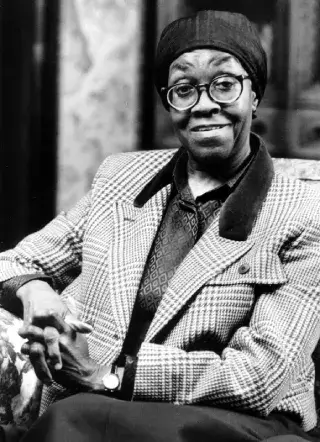Biography of Gwendolyn Brooks

| date | place | |
|---|---|---|
| born | June 07, 1917 | Topeka, Kansas |
| died | December 03, 2000 | Chicago |
Gwendolyn Brooks stands as a towering figure in American literature, particularly celebrated for her vivid and insightful portrayals of African American life. Born in Topeka, Kansas, and raised in Chicago, Illinois, Brooks was immersed in a rich cultural and literary environment from a young age. Her parents encouraged her literary talents, and by the age of 13, she had published her first poem in a children's magazine. This early encouragement set the stage for a prolific career that would break new ground in American poetry. Brooks's early work was heavily influenced by the urban environment of Chicago's South Side, where she spent much of her life. Her first collection, "A Street in Bronzeville" (1945), was lauded for its authentic depiction of the lives, hopes, and struggles of its inhabitants. Through her poetry, Brooks offered a lens into the complexities of Black urban life, navigating themes of poverty, racism, and the search for identity with both nuance and empathy. Her subsequent collection, "Annie Allen" (1949), marked a significant milestone in her career and in the history of American literature. Through the narrative of a young Black girl growing up in Chicago, Brooks explored themes of ambition, disillusionment, and personal growth. The collection's innovative use of verse and its emotional depth earned Brooks the Pulitzer Prize for Poetry in 1950, making her the first African American to receive this prestigious award. Throughout the 1960s and 1970s, Brooks's poems became increasingly politicized, reflecting the tumultuous era of the Civil Rights Movement and the rise of the Black Power movement. She became an important voice in the Black Arts Movement, advocating for the power of literature to enact social change and uplift Black voices. Her poetry from this period, including collections like "In the Mecca" (1968), delves into issues of injustice, resistance, and community solidarity with renewed vigor and urgency. Beyond her literary contributions, Brooks was deeply committed to nurturing future generations of writers. She taught creative writing to young people in Chicago's South Side and conducted numerous workshops for aspiring poets. Her mentorship extended beyond formal education, as she often provided financial support and encouragement to young Black writers, helping to foster a vibrant literary community. In recognition of her contributions to American literature and her role as a cultural ambassador for Illinois, Brooks was named the Poet Laureate of Illinois in 1968, a position she held for the remainder of her life. Her national influence was further acknowledged when she served as the consultant in poetry to the Library of Congress from 1985 to 1986, an appointment now known as the U.S. Poet Laureate. Gwendolyn Brooks's legacy is marked not only by her groundbreaking achievements and the depth of her literary work but also by her profound impact on the literary and cultural landscape of the United States. Her poetry, characterized by its technical skill, emotional range, and unflinching engagement with social issues, continues to inspire readers and writers alike. Brooks's life and work exemplify the power of literature to illuminate the human condition, challenge societal norms, and foster a deeper understanding of ourselves and our communities. Gwendolyn Brooks's poems are renowned for its incisive social commentary, technical sophistication, and profound empathy, offering a window into the complexities of African American life. Her work, deeply rooted in her own experiences growing up and living in Chicago, traverses the urban landscape of the South Side, capturing the beauty, hardship, and resilience of its Black community. Brooks's poetic voice, versatile and poignant, navigates the intersections of race, gender, and class, laying bare the societal injustices that shape the lives of her subjects. Through poem collections like "A Street in Bronzeville" and "Annie Allen," she crafts narratives that are at once personal and universal, blending traditional poetic forms with the vernacular to celebrate the richness of Black culture and the strength of its people. Brooks's later poetry, influenced by the Civil Rights Movement and the Black Arts Movement, adopted a more direct and confrontational tone, reflecting the changing socio-political landscape of America. In works such as "In the Mecca," she employs a more experimental style to explore themes of communal loss, despair, and the quest for justice, demonstrating her evolution as a poet and her commitment to activism. Her ability to capture the nuances of human experience, combined with her mastery of form—from sonnets to free verse—demonstrates a profound understanding of the craft of poetry. Gwendolyn Brooks's legacy as a poet is defined by her unwavering dedication to truth-telling, her innovative use of language, and her tireless advocacy for the voices of the marginalized, making her one of the most influential American poets of the 20th century.
Feel free to be first to leave comment.